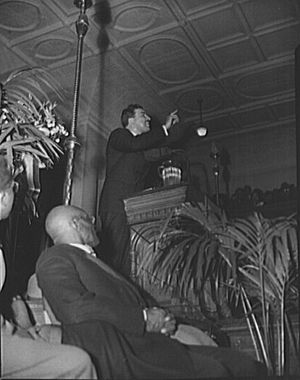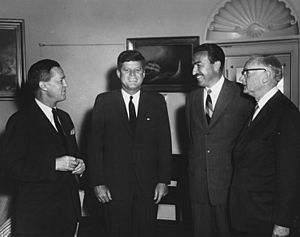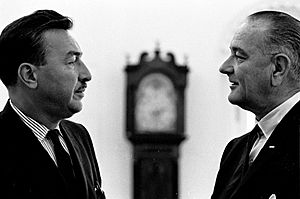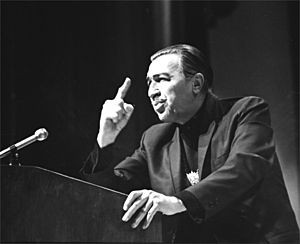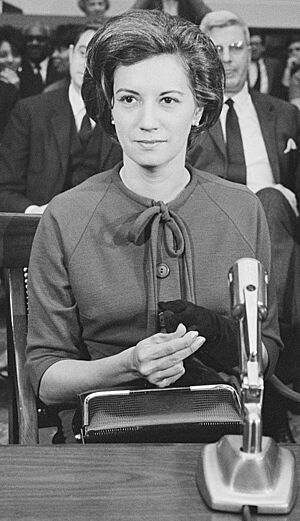Adam Clayton Powell Jr. facts for kids
Quick facts for kids
Adam Clayton Powell Jr.
|
|
|---|---|
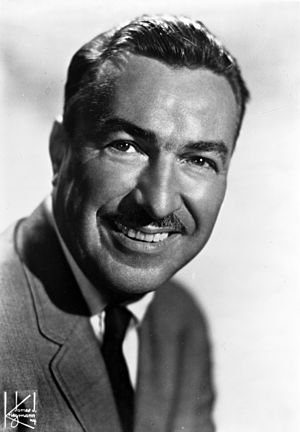 |
|
| Member of the U.S. House of Representatives from New York |
|
| In office January 3, 1945 – January 3, 1971 |
|
| Preceded by | Walter A. Lynch |
| Succeeded by | Charles Rangel |
| Constituency | 22nd district (1945–1953) 16th district (1953–1963) 18th district (1963–1971) |
| Member of the New York City Council from Manhattan At-Large |
|
| In office January 1, 1942 – December 31, 1943 |
|
| Preceded by | Multi-member district |
| Succeeded by | Benjamin J. Davis |
| Personal details | |
| Born | November 29, 1908 New Haven, Connecticut, U.S. |
| Died | April 4, 1972 (aged 63) Miami, Florida, U.S. |
| Political party | Democratic |
| Other political affiliations |
American Labor |
| Spouses |
Yvette Flores Diago
(m. 1960; separated 1965) |
| Children | Adam III Adam IV 1 adopted |
| Parent |
|
| Education | City College of New York Colgate University (BA) Columbia University (MA) Shaw University (DDiv) |
Adam Clayton Powell Jr. (born November 29, 1908 – died April 4, 1972) was an American pastor and politician. He represented the Harlem neighborhood of New York City in the United States House of Representatives from 1945 to 1971. He was the first African American elected to Congress from New York. He was also the first from any state in the Northeast.
Powell was re-elected for almost 30 years. He became a powerful national politician for the Democratic Party. He was a strong voice for civil rights and social issues. He also encouraged U.S. presidents to support new nations in Africa and Asia. These nations were gaining independence after being ruled by other countries.
In 1961, Powell became chairman of the Education and Labor Committee. This was the most powerful position held by an African American in Congress at that time. As chairman, he helped pass important social and civil rights laws. These laws were supported by presidents John F. Kennedy and Lyndon B. Johnson. Later, Powell faced challenges and was temporarily removed from his seat in 1967. However, he was re-elected and got his seat back in 1969. He lost his seat in 1970 to Charles Rangel and then retired from politics.
Contents
Growing Up and Learning
Powell was born in 1908 in New Haven, Connecticut. He was the second child and only son of Adam Clayton Powell Sr. and Mattie Buster Shaffer. His parents had mixed African and European backgrounds. His father, Adam Clayton Powell Sr., became a well-known Baptist minister. In 1908, his father became the pastor of the Abyssinian Baptist Church in Harlem, New York City.
Powell Jr. grew up in a comfortable home in New York City. He attended Townsend Harris High School. Then he studied at City College of New York before going to Colgate University. At Colgate, he earned his bachelor's degree in 1930. After college, Powell continued his studies. In 1931, he earned a master's degree in religious education from Columbia University. He also joined Alpha Phi Alpha, a fraternity for African-American college students.
His father's church, Abyssinian Baptist Church, grew very large. It became a community of 10,000 people. This happened during the Great Migration. This was a time when many African Americans moved north from the South.
Making a Difference in the Community
After becoming a minister, Powell helped his father with church charity work. He gave out more meals and clothes to people in need. This helped him understand the lives of working-class and poor people in Harlem.
During the Great Depression in the 1930s, Powell became a civil rights leader in Harlem. He was a popular and inspiring speaker. He fought for jobs and affordable housing for the community. As head of the Coordinating Committee for Employment, Powell used community organizing. He pressured large businesses to hire black employees for better jobs.
He organized big meetings, rent strikes, and public campaigns. These actions pushed companies, utilities, and Harlem Hospital to hire black workers. Before, black workers were often limited to only the lowest-paying jobs. For example, Powell organized a protest at the 1939 New York World's Fair offices. As a result, the Fair hired more black employees. In 1941, he led a bus boycott in Harlem. This led the New York City Transit Authority to hire 200 black workers. Powell also fought for drugstores in Harlem to hire black pharmacists. He encouraged people to shop only where black workers were hired. Powell believed that "Mass action is the most powerful force on earth." He added, "As long as it is within the law, it's not wrong; if the law is wrong, change the law."
In 1937, Powell took over from his father as pastor of the Abyssinian Baptist Church. He remained the church's pastor until 1972. In 1942, he started a newspaper called People's Voice. It aimed to inform African Americans about local events, civil rights, and global issues. The newspaper also shared his ideas.
Starting a Political Career
Serving New York City
In 1941, Powell was elected to the New York City Council. He became the city's first black Council member.
Joining Congress
In 1944, Powell ran for the United States Congress. His main goal was to fight for civil rights for African Americans. He wanted fair employment practices and an end to poll taxes and other unfair practices. Poll taxes were fees people had to pay to vote. These taxes were used in some southern states to stop most black people from voting.
Powell was elected as a Democrat. He became the first black Congressman from New York State. As a Congressman, Powell was one of the few black voices in Washington. He spoke out against unfair treatment. He challenged segregationists in Congress. For example, he was one of the only people who dared to challenge a Congressman from Mississippi for using a racist word. He also took black people who visited him to eat in the "Whites Only" House restaurant.
Powell worked closely with the National Association for the Advancement of Colored People. He created a plan called the "Powell Amendments." He would add an amendment to bills that spent federal money. This amendment would say that federal funds could not go to places that practiced segregation. This idea later became part of the Civil Rights Act of 1964.
Working on Global Issues
Powell also cared about developing nations in Africa and Asia. He traveled overseas and urged U.S. leaders to support countries gaining independence. During the Cold War, many of these nations wanted to stay neutral. Powell gave speeches in Congress to celebrate the independence of countries like Ghana and Indonesia.
In 1955, Powell attended a conference in Indonesia. He made a good impression internationally. He spoke about America's race issues but also defended the U.S. against criticism. When he returned, he was praised by both political parties. He even met with President Dwight D. Eisenhower.
Powell suggested that the U.S. should promote American popular arts, like jazz music, overseas. He thought this would be better than just sending symphony orchestras. The State Department agreed. The first tour with jazz musician Dizzy Gillespie was a huge success. This led to many more popular tours by other musicians.
Leading a Powerful Committee
In 1961, Powell became chairman of the United States House Committee on Education and Labor. This was a very important position. In this role, he oversaw federal social programs. These included programs for minimum wage and Medicaid. He helped expand the minimum wage to include more workers. He also worked for equal pay for women.
His committee helped pass many important laws. These laws were part of President Kennedy's "New Frontier" and President Johnson's "Great Society" programs. They also supported the War on Poverty. His committee successfully helped pass "49 pieces of bedrock legislation," as President Johnson noted.
Powell was key in passing laws that ended segregation in public schools. He challenged the practice of charging black people a poll tax to vote. Poll taxes for federal elections were banned by the 24th Amendment in 1964. The Voting Rights Act of 1965 later helped ensure that all African Americans could register and vote.
Family Life
In 1933, Powell married Isabel Washington, a singer and entertainer. He adopted her son, Preston.
After their divorce, Powell married jazz pianist and singer Hazel Scott in 1945. They had a son named Adam Clayton Powell III.
Powell later married Yvette Flores Diago from Puerto Rico in 1960. They had a son, Adam Clayton Powell IV. Adam Clayton Powell IV also became a politician in New York City.
Later Years and Passing
In April 1972, Powell became very ill. He passed away on April 4, 1972, at age 63, in Miami, Florida. After his funeral, his son, Adam III, scattered his ashes over the waters of Bimini, where Powell had a home.
His Lasting Impact
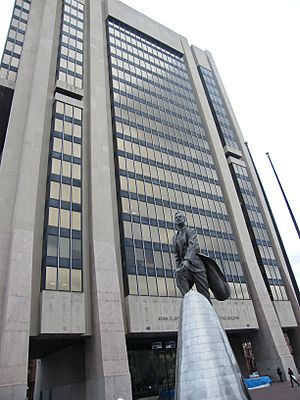
Many places are named after Adam Clayton Powell Jr. Seventh Avenue in Harlem is now called Adam Clayton Powell Jr. Boulevard. A large building, the Adam Clayton Powell Jr. State Office Building, was named for him in 1983.
Two New York City schools were also named after him. In 2011, the Adam Clayton Powell Jr. Paideia Academy opened in Chicago.
Powell's work also led to important changes in how Congress handles ethics. Investigations into his conduct helped create a permanent ethics committee and a code of conduct for House Members.
In Books and Movies
Powell has been featured in various media:
- The 2002 TV movie Keep the Faith, Baby starred Harry Lennix as Powell.
- Giancarlo Esposito played Powell in the 2019 TV series Godfather of Harlem.
- Paul Deo included Powell in his 2017 Harlem mural Planet Harlem.
- Jeffrey Wright portrayed Powell in the 2023 Netflix film Rustin.
 | Roy Wilkins |
 | John Lewis |
 | Linda Carol Brown |


